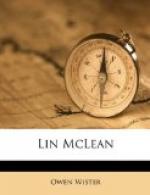“Yes, I’m a green horse,” assented Mr. McLean, gallantly; “ain’t used to the looks of a twenty-dollar bill, and I shy at ’em.”
From his face—that jocular mask—one might have counted him the most serene and careless of vagrants, and in his words only the ordinary voice of banter spoke to the Governor. A good woman, it may well be, would have guessed before this the sensitive soul in the blundering body, but Barker saw just the familiar, whimsical, happy-go-lucky McLean of old days, and so he went gayly and innocently on, treading upon holy ground. “I’ve got it!” he exclaimed; “give your wife something.”
The ruddy cow-puncher grinned. He had passed through the world of woman with but few delays, rejoicing in informal and transient entanglements, and he welcomed the turn which the conversation seemed now to be taking. “If you’ll give me her name and address,” said he, with the future entirely in his mind.
“Why, Laramie!” and the Governor feigned surprise.
“Say, Doc,” said Lin, uneasily, “none of ’em ain’t married me since I saw yu’ last.”
“Then she hasn’t written from Laramie,” said the hilarious Governor, and Mr. McLean understood and winced in his spirit deep down. “Gee whiz!” went on Barker, “I’ll never forget you and Lusk that day!”
But the mask fell now. “You’re talking of his wife, not mine,” said the cow-puncher very quietly, and smiling no more; “and, Doc, I’m going to say a word to yu’, for I know yu’ve always been my good friend. I’ll never forget that day myself—but I don’t want to be reminded of it.”
“I’m a fool, Lin,” said the Governor, generous instantly. “I never supposed—”
“I know yu’ didn’t, Doc. It ain’t you that’s the fool. And in a way—in a way—” Lin’s speech ended among his crowding memories, and Barker, seeing how wistful his face had turned, waited. “But I ain’t quite the same fool I was before that happened to me,” the cow-puncher resumed, “though maybe my actions don’t show to be wiser. I know that there was better luck than a man like me had any call to look for.”
The sobered Barker said, simply, “Yes, Lin.” He was put to thinking by these words from the unsuspected inner man.
Out in the Bow Leg country Lin McLean had met a woman with thick, red cheeks, calling herself by a maiden name; and this was his whole knowledge of her when he put her one morning astride a Mexican saddle and took her fifty miles to a magistrate and made her his lawful wife to the best of his ability and belief. His sage-brush intimates were confident he would never have done it but for a rival. Racing the rival and beating him had swept Mr. McLean past his own intentions, and the marriage was an inadvertence. “He jest bumped into it before he could pull up,” they explained; and this casualty, resulting from Mr. McLean’s sporting blood, had entertained several hundred square miles of alkali. For the new-made husband the joke soon died. In the immediate




